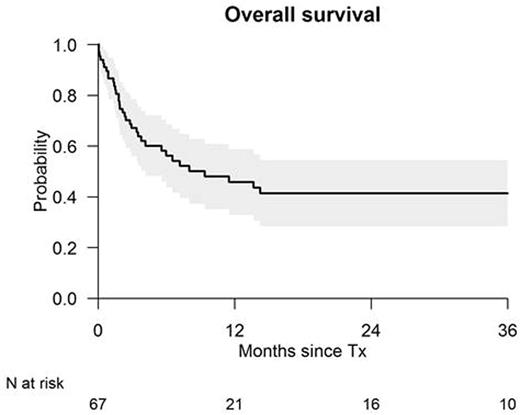Abstract
Hemophagocytic lymphohistiocytosis (HLH; hemophagocytic syndrome) is a rare syndrome of potentially fatal, uncontrolled hyperinflammation. Allogeneic stem cell transplantation (alloSCT) is indicated in familial, recurrent or progressive HLH. Additional recommendations include central nervous system involvement and unknown triggering factor. While data for alloSCT outcome are available for the pediatric setting, information for adults is very limited.
The aim of this study was to retrospectively analyze the information from the EBMT databases about adult HLH patients who underwent allogeneic stem cell transplantation.
We obtained data of 67 adult (≥18 years of age) patients transplanted due to HLH. The first reported transplantation was in 1995. Due to the rise of HLH awareness, the number was steadily growing. Until 2006 only 12 transplants were performed, while in the next 10 years it was 55. Median age at transplantation was 28 (range: 18-65). There was a slight male predominance 43/67 (64%). The majority of patients were reported with secondary HLH 33/67 (49%), the familial disease was reported in 29/67 (43%) patients. In two patients triggering factor was attributed to malignancy.
The majority of patients received stem cells obtained from the peripheral blood (52/67; 78%) while for the remaining ones it was bone marrow. Reduced intensity conditioning was used since 2004 in 23/63 (37%)of patients. Thirteen (19%) patients received TBI. Donor choice was: matched unrelated 33 (50%), mismatched unrelated 7 (11%), identical sibling 26 (39%). Engraftment was observed in 55/61 (77%); 7/61 (12%) patients suffered from primary and 2/61 (3%) from secondary graft failure. The cumulative incidence of acute graft versus host disease (GvHD) at 100 days was 26% (95% CI 15-37%). The cumulative incidence of chronic GvHD at 1 year after alloSCT was 13% (95% CI 2-23%) and increased to 31% at 3 years (95% CI 16-47%).
The overall survival until three years is shown in Fig.1. The median survival time was 8 months. The three year OS was 41% (95% CI 28-55%). For patients who survived until 3 months, this proportion was more favorable with an OS of 62% (95% CI 45-78%) at 3 years after transplantation.
Among 19 patients with observation times longer than 15 months, only one patient died (in the 48th month after alloSCT due to relapse which occurred in the 12th month). Main causes of death in the described group were: relapse or progression 10/36 (28%), infection 9/36 (25%) and GvHD 6/36 (17%). After 12 months no more relapses of HLH were recorded - the cumulative incidence reached 19%. The non-relapse mortality reached 42% after 15 months.
The familial disease was associated with a better prognosis than secondary HLH (p=0.04). Unlike the pediatric population, where reduced intensity conditioning (RIC) was associated with higher survival, in adult patients there was no difference between the conditioning types. The choice of donor: matched related versus matched unrelated did not alter the survival.
To our knowledge, this is the largest group of adult patients with HLH who underwent allogeneic stem cell transplantation. Relatively low relapse incidence shows that alloSCT can effectively cure HLH. Patients who survive the first period after this procedure can expect a long disease-free survival.
Overall survival after allogeneic stem cell transplantation for adult HLH patients until 36 months (95% Confidence Intervals are shown in grey). The number of patients at risk is indicated below the time axis at the corresponding time points.
Overall survival after allogeneic stem cell transplantation for adult HLH patients until 36 months (95% Confidence Intervals are shown in grey). The number of patients at risk is indicated below the time axis at the corresponding time points.
Jedrzejczak:Celgene: Consultancy; Roche: Consultancy, Research Funding; Jansen-Cilag: Consultancy; Novartis: Consultancy, Research Funding; Amgen: Research Funding; BMS: Research Funding; Angelini: Consultancy; Sandoz: Consultancy. Kobbe:Jansen: Honoraria, Other: travel support; Celgene: Honoraria, Other: travel support, Research Funding. Kroeger:Sanofi: Honoraria, Research Funding.
Author notes
Asterisk with author names denotes non-ASH members.


This feature is available to Subscribers Only
Sign In or Create an Account Close Modal